|
|
|
Sort Order |
|
|
|
Items / Page
|
|
|
|
|
|
|
| Srl | Item |
| 1 |
ID:
140460
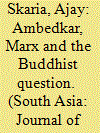

|
|
|
|
|
| Summary/Abstract |
This essay tries to frame one question, which at its most abbreviated can be posed thus: why does Ambedkar convert to Buddhism? Given Ambedkar's militant secularism, to ask this question is also to ask: what assumption of responsibility does that conversion enable which exceeds secular responsibility? This essay tracks how Ambedkar's religion questions both the liberal concept of minority, and the dissolution of the minor that is staged in Marx's critique simultaneously of religion and secularism. Buddhism becomes in the process a religion of the minor.
|
|
|
|
|
|
|
|
|
|
|
|
|
|
|
|
| 2 |
ID:
120021
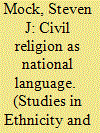

|
|
|
| 3 |
ID:
066651
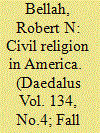

|
|
|
| 4 |
ID:
169553
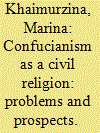

|
|
|
|
|
| Summary/Abstract |
The concept of a civil religion is now gaining importance in Chinese society. Religious traditions (values, symbols, rituals, convictions) join all citizens into a single whole that determines the religious component of everyday life. Founded on Confucian values, civil religion in China can give the Chinese nation a complete commonality of interests, feelings, and thought.
|
|
|
|
|
|
|
|
|
|
|
|
|
|
|
|
| 5 |
ID:
168370
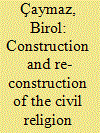

|
|
|
|
|
| Summary/Abstract |
The longest living among its twentieth-century counterparts, the century-old cult of Atatürk is deeply rooted in the collective conscience in Turkey. In this essay, we will try to show the dual role of the image of Atatürk in the political struggle, both in current times and in the past, as a national hero created around civil religiosity. In the case of Atatürk, not only do we encounter a figure that primarily facilitates the legitimation of the existing political and social system, but also an eternal saviour who is called upon in order to oppose that system at various times.
|
|
|
|
|
|
|
|
|
|
|
|
|
|
|
|
| 6 |
ID:
086758
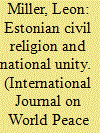

|
|
|
|
|
| Publication |
2009.
|
| Summary/Abstract |
After the collapse of Soviet Union, Estonia took pride in becoming a model of progressive social, economic and political reform. Its accomplishments have been commendable given the fact of its enormous diversity challenge. This diversity challenge (that Estonia must effectively manage as a part of its adjustment to democracy) is largely due to massive population shifts that were a part of Soviet strategy.
|
|
|
|
|
|
|
|
|
|
|
|
|
|
|
|
| 7 |
ID:
141686
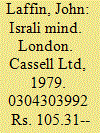

|
|
|
|
|
| Publication |
London, Cassell Ltd, 1979.
|
| Description |
243p.hbk
|
| Standard Number |
0304303992
|
|
|
|
|
|
|
|
|
|
|
|
Copies: C:1/I:0,R:0,Q:0
Circulation
| Accession# | Call# | Current Location | Status | Policy | Location |
| 020847 | 956.94/LAF 020847 | Main | On Shelf | General | |
|
|
|
|
| 8 |
ID:
104156
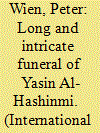

|
|
|
|
|
| Publication |
2011.
|
| Summary/Abstract |
After his premature death in exile in Beirut in 1937, the body of former Iraqi prime minister Yasin al-Hashimi became a matter of contention between the Syrian and Iraqi governments, as did his legacy as an avid Pan-Arabist. When the coffin with the deceased stopped in Damascus on its promised transfer to Baghdad, the Syrian National Bloc government used the opportunity to stage a solemn republican funeral to bolster its Arab nationalist credentials. Syrian conflicts with the Iraqi government that had removed al-Hashimi in a military coup in the previous year ultimately made Yasin's return impossible, however, and he was buried in Damascus, next to Saladin's mausoleum at the Umayyad Mosque. Unfortunately for the National Bloc, the funeral coincided with the first clashes over the Alexandretta crisis. The resulting street protests destroyed all public confidence that the bloc had gained during the funeral, underlining the volatile nature of nationalist politics at the time.
|
|
|
|
|
|
|
|
|
|
|
|
|
|
|
|
| 9 |
ID:
089369
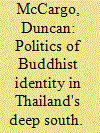

|
|
|
|
|
| Publication |
2009.
|
| Summary/Abstract |
This article sets out to criticise arguments by scholars such as Charles Keyes and Donald Swearer, who have framed their readings of Thai Buddhism through a lens of 'civic' or 'civil' religion. Drawing on fieldwork conducted in the southern border provinces, the paper argues that religious tolerance is declining in Thailand, and that anti-Muslim fears and sentiments are widespread among Buddhists. Some southern Buddhists are now arming themselves, and are creating militia groups in the face of growing communal violence. In the rest of Thailand, hostility towards Muslims, coupled with growing Buddhist chauvinism, is being fuelled by developments in the south.
|
|
|
|
|
|
|
|
|
|
|
|
|
|
|
|
| 10 |
ID:
096568
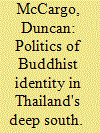

|
|
|
|
|
| Publication |
2009.
|
| Summary/Abstract |
This article sets out to criticise arguments by scholars such as Charles Keyes and Donald Swearer, who have framed their readings of Thai Buddhism through a lens of 'civic' or 'civil' religion. Drawing on fieldwork conducted in the southern border provinces, the paper argues that religious tolerance is declining in Thailand, and that anti-Muslim fears and sentiments are widespread among Buddhists. Some southern Buddhists are now arming themselves, and are creating militia groups in the face of growing communal violence. In the rest of Thailand, hostility towards Muslims, coupled with growing Buddhist chauvinism, is being fuelled by developments in the south.
|
|
|
|
|
|
|
|
|
|
|
|
|
|
|
|
| 11 |
ID:
133722
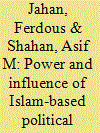

|
|
|
|
|
| Publication |
2014.
|
| Summary/Abstract |
Bangladesh has received scholarly attention about the extent and nature of Islamism in the political domain. We argue that, to analyze the significance of religion in the political process, it is essential to consider the role of religion in both influencing the policy and electoral outcome. Based on an in-depth qualitative study during the most recent election of 2008, we review previous elections results and the policy influence of religion-based parties; we argue that, in Bangladesh, Islamic parties' policy influence is very high and electoral success is very low. A deeply entrenched civil religion in the form of nationalistic identity bars religion from playing a significant role in influencing the voting behavior of the citizens. The mainstream political parties have so far failed to recognize the significance of this civil religion.
|
|
|
|
|
|
|
|
|
|
|
|
|
|
|
|
| 12 |
ID:
086757
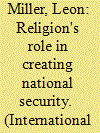

|
|
|
|
|
| Publication |
2009.
|
| Summary/Abstract |
Leon Miller begins to address the thorny issue of how to create a political culture acceptable to all citizens in the absence of a dominant power. Can a "civil religion" be developed "from below" that will provide enough cultural cohesion for a democratic state in which there is cultural diversity? He writes from the perspective of Estonia where, after the collapse of the Soviet Union, there are about 60 percent Estonians and 40 percent Russians and foreign nationals. How can such a country create unified national symbols? Since the time of Rousseau the idea of a civil religion, as opposed to an official state religion like Catholicism, has been widely discussed. However, civil religion has to be a less comprehensive and more open-ended set of beliefs, and must rely on "truths" that appear much more "self-evident" than many religious and ideological doctrines. In a sense, Marxism was a failed attempt to create a "scientific" civil religion. However, it became closed and stagnant when allied to the power of the state. Can any civil religion transcend these problems?
|
|
|
|
|
|
|
|
|
|
|
|
|
|
|
|
|
|
|
|
|